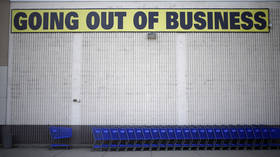Thousands of German stores on brink of closure – Spiegel

Over 15,000 German stores are facing bankruptcy due to soaring energy costs, Der Spiegel reported on Friday, citing the German Retail Association (HDE).
According to the report, the HDE wrote a letter to Vice-Chancellor and Economy Minister Robert Habeck in which it warned that the “exploding energy costs” are making it impossible for increasing numbers of retailers to make ends meet. The group called the situation “existentially threatening” and said that around 16,000 businesses may go bankrupt this year, while the “negative trend” is likely to continue through 2023.
The group said the rise in energy costs, which have spiked by 147% on average since the beginning of the year, is preventing retailers from making a profit. The share of electricity costs in sales volumes for retailers has already reached almost 3% on average and many in the industry expect this figure to rise to as high as 5% in 2023.
According to HDE President Josef Sanktjohanser and Managing Director Stefan Genth, the returns generated in many retail sectors are already extremely low today. In the case of clothing, the operating profit as a percentage of sales is 2.1%, while in the case of shoes it is currently negative at -1.2%. Even in the food segment, it is only 2-4%.
Such a state of affairs may put many companies “at a disadvantage,” the group warned. Given the sharp decline in the purchasing power of private households and record-high inflation, it will likely not be possible to shift the rising energy costs to consumers, the HDE states. Therefore, the group urged Berlin to intervene by temporarily limiting tariffs and cutting electricity taxes to a minimum.
For more stories on economy & finance visit RT's business section












